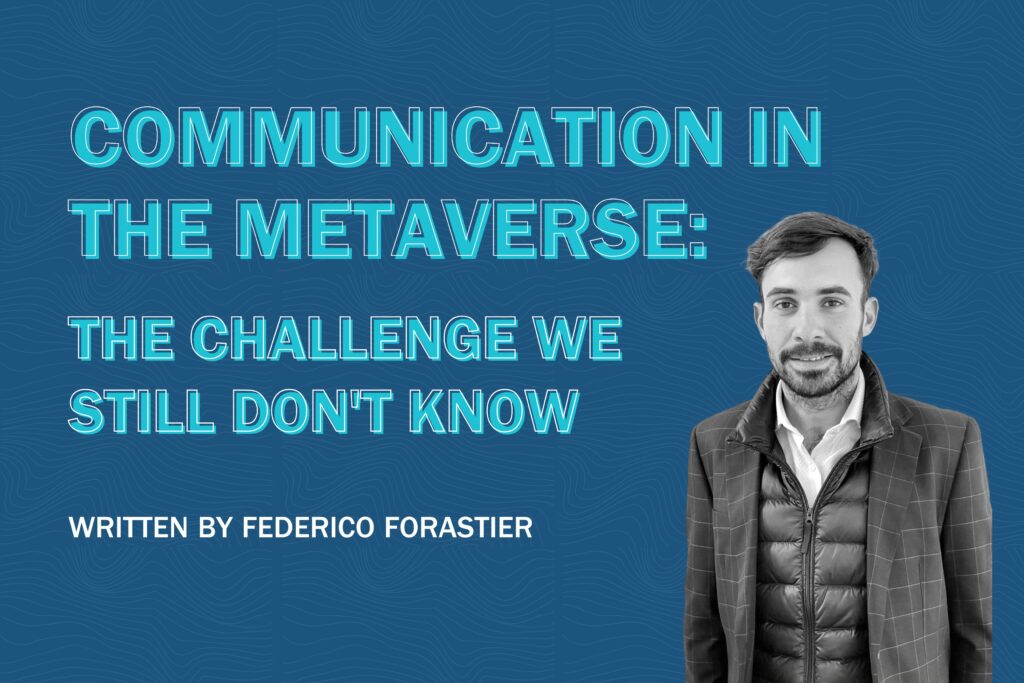Communication in the Metaverse: The Challenge we Still Don’t Know

The constant improvement of technology challenges us to grow as communicators. Better tactics will always require better strategists — a statement that is especially true in a set of channels not yet well defined.
Organizations are constantly facing new technological and cultural challenges, but the speed at which they occur often barely allows enough time for analysis. As communicators preparing for the Metaverse, however, we can prepare so that this consolidation does not take us by surprise. Still, the hyper-acceleration of change forces organizations to redefine their communication behavior in several aspects and look for new allies in their strategic developments.
Author of “Framework for the Metaverse” Matthew Ball was quoted in a Forbes article, which was then translated to say “the Metaverse is not so much a virtual world, but ‘a kind of successor state of the mobile Internet, a framework for a hyperconnected life… it is a change that will emerge slowly over time as different products, services and capabilities are integrated and merged’”
For now, one of the best-known examples of the Metaverse is mixed reality for online retail purchases. It allows people to visit a virtual store where they can walk around, pick up items, try on items, and talk to a shop assistant. Therefore, some questions that arise immediately include how a shop will communicate with its clients who enter and leave virtuality, how these Metaverse clients will impact a business’ success, and how virtual reality will impact the lives of every-day users.
As public relations students and future professionals, we need to pay attention to the objective, public, and context surrounding the metaverse. These three factors greatly impact the communication process, and for a multi-channel as uncertain and different as the Metaverse, PR professionals need to be constantly reassessing how the change in objective, publics, and context in Metaverse communication will change their messaging.
Regardless of whether the objective is to decentralize the communications of government regulations or to streamline producer-prosumer interactions, messaging tactics will change with the introduction of the Metaverse. Especially with the current context of mistrust within traditional channels of interaction, it is important to stay up-to-date on the best ways to reach your public.
When we have to communicate and interact with others in the convergence of channels proposed by the Metaverse, our objectives, publics, and contexts will be the foundation for the analysis of strengths, weaknesses, opportunities, and threats that PR professionals must assess in order to succeed.
Adapting to new social dynamics means adjusting to the conventions and languages used by all. It is like the task of a neophyte who accesses a new culture; one must observe the culture, make assumptions, and integrate themselves. It is no longer enough to theorize on this subject; rather, it is necessary to contribute and participate actively by assuming conventions and rules of the collective. The optimal criterion for this dissemination is to focus on the intermediate step between theory and practice.
Although we still do not know exactly the segmentation of audiences, channels, and codes that will be in the Metaverse, we do know that the first audiences are made up of a majority of young people who are dissatisfied with the approaches of traditional politics, the regulation of the markets, neo-capitalism, and more. Societies are changing their values, needs, and circumstances. Focusing on this audience will help us understand the best practices of communication within the Metaverse.
The codes and culture of the receivers within the Metaverse are a communication channel, but they are also a technological concept. The present is immersed in constant technological revolutions and radicalizations in information technologies. Even today’s “new digital media” will soon be considered traditional, and platforms such as the Metaverse will be much more accessible. Brands, politicians, and — most importantly — our audiences will all be using platforms such as the Metaverse, but the audiences and ways to communicate with them may look very different than what we currently know.

Federico Forastier is 29 years old and currently living in Buenos Aires. He has experience working in Corrientes government, where he organized events, protected the image of the Security Minister, worked in internal communications, and helped with both social media and the press. He is currently a PR Senior executive at Feedback Agency in Buenos Aires. Federico also serves as the UADE PRSSA Chapter’s digital communications committee member. His favorite topics are political communication, public affairs, and digital social media. Outside of these pursuits, he is an amateur guitar player, a nature devotee, and tennis lover.
